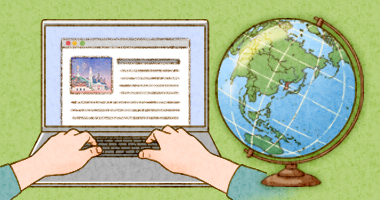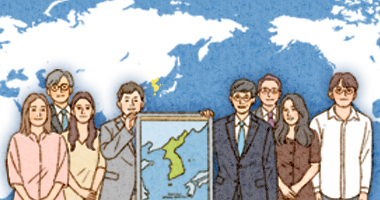Examples of ‘The Development of Korea’
in Dutch textbooks
This chapter introduces the process of including
the development of Korea in Dutch textbooks.
2) Process of containing the explanation of
the development of Korea in the textbook
① Reasons for describing the Republic of Korea in textbooks
– Emphasizing the need to describe ‘The Republic of Korea’

textbooks, it was necessary to first understand the timing of the re-issue
of Dutch textbooks and the decision-making structure that determines
the contents of textbooks.
Since then, it has been important to persuade people to the decision-
making process, including textbook writers, publisher presidents, and
personnel from education-related organizations.
The most important thing in the process of persuading them was the
“Customized explanation of the country (the Netherlands).”
After considering the history and situation of each country, it was to
explain the necessity and effect of Korean description in the textbook
from the perspective of the country.
Let’s take a look at the logic that convinced the Dutch writers!
First, The development of Korea can stimulate the intellectual curiosity of Dutch students and teach them lessons.
same time out of a total of 80 countries that gained independence from colonies after World War II.
The achievements of Western society over 300 years have been achieved in Korea in only half a century.
This development of Korea has “world-historical significance” as an unprecedented example.
“How could the Republic of Korea be the only one who succeeded like this? What’s the reason?“
The development of Korea stimulates Dutch students to think about what makes them different from other countries
during Korea’s successful process, stimulating their intellectual curiosity.
Students learn the content and realize that the differences include the diligence of the Korean people, the setting of
their vision, and the spirit of “Can-do.”
The case of the development of Korea through the Korean spirit, Korean participation, effort, and sacrifice sends the
message to students that ‘The fate of a country depends on the will, effort, and attitude of the people.’
If Dutch students are taught this, they will be able to consider their lives, the future of their own country, and the
world, establish their attitudes and values, and grow into global leaders.
Second, The development of Korea is closely linked to the relationship between the two countries.
The relationship between the Netherlands and the Republic of Korea can be confirmed during Korea’s development.
The Netherlands sent 5,322 soldiers to the Republic of Korea as a member of the United Nations Command during
the Korean War. The Republic of Korea was able to survive at the expense of the veterans who sacrificed their lives for
democracy and freedom in the Republic of Korea and succeeded in becoming an advanced country thanks to the
support of the international community, including the Netherlands.
Thanks to this, the Republic of Korea has made unprecedented progress and even world-famous Korean companies
have emerged. Having not forgotten the sacrifices made by the Netherlands for the Republic of Korea, famous Korean
companies went back to the Netherlands and sold several products, providing about 40,000 jobs.
The Netherlands joins us at the beginning of Korea’s development. Teaching Dutch veterans about their contributions
through the Korean War will not only affect their self-esteem but also educate Dutch students about the value of the
common humanity that their contributions to the international community eventually return to their advantages.
Third, The Dutch public's increased interest in the Republic of Korea can lead to the purchase of Korean-related publications.
In the early 2010s, the Korean Wave began to spread spontaneously in the Netherlands, including K-POP, Korean food,
and Korean language. Some Dutch people were interested in the Republic of Korea, Korean culture, and the Korean Wave.
In addition, there was an exchange between Korea and the Netherlands, with famous Korean companies providing jobs
in the Netherlands, and favorable public opinion about the Republic of Korea was being formed in the Netherlands.
As the Dutch public’s interest in the Republic of Korea gradually increased, more and more people wanted to know
more about the Republic of Korea. Considering this situation, if textbooks and other books describe the development
of Korea and inform people about the country, they will be able to purchase the publication. This could ultimately benefit
publishers, too.
The following effects were presented with the Dutch customized persuasion logic for technology in the development of Korea.
1. Educational Effects 2. Introduction of Relationship with the Netherlands and Positive Results
3. Effects of Writers, Publishers, Politicians, etc
After this persuasion, the development of Korea was successfully included in Dutch textbooks.
② The efforts of overseas Koreans

Until the development of Korea was included in Dutch textbooks, overseas
Koreans in the Netherlands provided great help.
To describe Korea in Dutch textbooks, officials at the Korean Embassy in the
Netherlands had to review the contents of the textbooks written in Dutch by
each publisher. In the process, the officials discussed the plans and progress
of the Dutch textbook project by sharing them with the Korean Association of
the Netherlands.
Overseas Koreans actively expressed their opinions on the textbook business.
An overseas Korean teenager personally analyzed and organized all the
descriptions of Dutch textbooks and sent them to the embassy with image
materials.
In addition, another Korean student provided presentation materials that can
be used to promote Korea’s development to textbook writers. Another overseas
Korean sent an English translation of a textbook specialized in Korean produced
by the embassy into Dutch.
During the textbook project, there was active support and voluntary participation
from the overseas Korean community, which catalyzed uniting the Korean
community. This participation not only touched the hearts of the Dutch people,-
but also left the meaning of ‘public diplomacy’ with overseas Koreans.
The efforts of the embassy and overseas Koreans also resonated with the Dutch
textbook makers, and thanks to these efforts, the description of the development
of Korea in Dutch textbooks was successfully carried out.